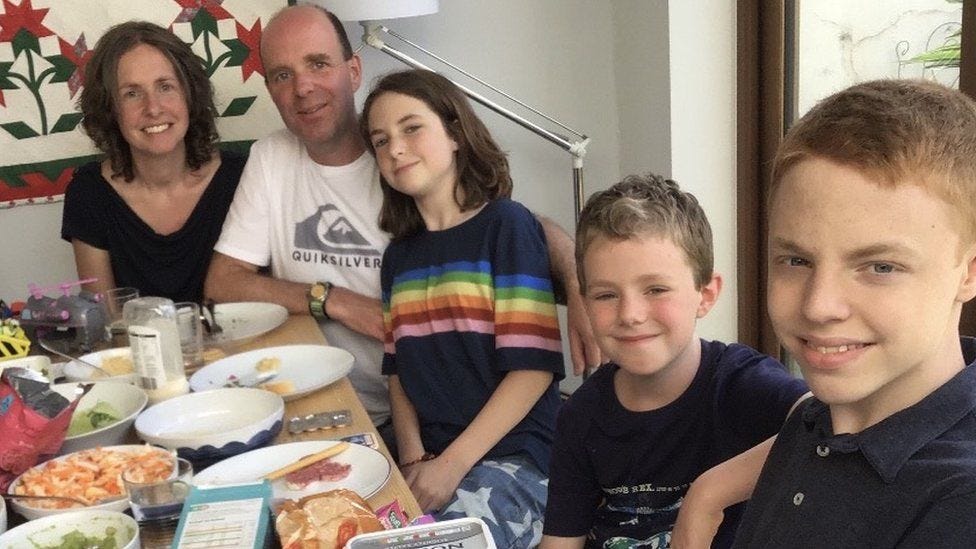
The Bingham Family
- A mom was forced to choose between donating her kidney to her son or daughter, who both suffer from the same genetic disorder.
- Sarah Bingham, 41, of Northumberland, UK, was faced with the decision when her two eldest children, 20-year-old Noah and 16-year-old Ariel, were diagnosed with nephronophthisis.
- Nephronophthisis is a genetically inherited condition that impairs kidney function through inflammation and scarring.
- Their father, 49-year-old Darryl Bingham, can’t donate as he has a different blood type, so the decision was left to their mother.
- Visit Insider’s homepage for more stories.
A mom was forced to choose between donating her kidney to her son or daughter, who both suffer from the same genetic disorder.
Sarah Bingham, 41, of Northumberland, UK, faced the decision when her two eldest children, 20-year-old Noah and 16-year-old Ariel, were diagnosed with nephronophthisis, a condition which impairs kidney function through inflammation and scarring.
Professor John Sayer, a consultant nephrologist at Freeman Hospital in Newcastle where Noah is currently being treated, told Insider that he believes that there are 100 children in the UK with this diagnosis.
He added: “Unfortunately, the diagnosis can be missed, so I estimate there are many more cases that remain undiagnosed.
“It is a rare disease but would account for a large proportion of childhood kidney failure, usually by 13-years-old, but there are a few cases of people presenting in their late 20s with this condition.”

The Bingham Family
The problems started in 2016 for Ariel, whose perpetual tiredness was initially blamed on exam stress but in July that year, she was taken to hospital with a severe stomach ache, the BBC reported.
Testing revealed that her kidneys were only functioning at 25% capacity, which has since decreased to 17%, according to The Mirror.
Professor Sayer said someone of her and her brothers' age should have 100% kidney function and that "any reduction in a child or young person is abnormal and warrants further investigation."

The Bingham Family
In 2019, Noah Bingham was diagnosed with nephronophthisis after becoming violently ill and vomiting blood, just days before he was due to begin studying astrophysics at university, the BBC added.
He also has gastroparesis, a condition in which the stomach does not empty properly, which has led to severe weight loss, according to The Sun, and needs dialysis, which his Ariel was able to avoid.
Both now need a kidney transplant and their father, 49-year-old Darryl Bingham, cannot donate as he has a different blood type, so the tough decision was left to Mrs. Bingham, The Mirror added.
She told Wales Online: "It was really hard knowing that both my children needed a kidney, but I only had one I could give. It was an incredibly hard decision to make and nobody can make it for you."
"As a mum, you naturally want to do all you can to spare your children any pain," she continued.
Since then, two family friends who wish to remain anonymous have been matches for Noah Bingham, meaning that Mrs. Bingham will be able to donate her kidney to her daughter, Ariel, iNews reported.

The Bingham Family
The family's youngest child, 12-year-old Casper, who has autism-like both of his older siblings, is currently being tested for the disorder.
Dr. Richard S Trompeter, a pediatric nephrologist at Great Ormond Street Hospital, told Insider: "The problem with [nephronophthisis] is that it is a genetically inherited, autosomal recessive condition. If the parents are carrying it, there's a one in four chance of getting it."
Recently, Mr. Bingham tackled the Christmas challenge of running 12,000 steps a day for 12 days to fundraise for Kidney Research UK, all while wearing a purple cape, the color of the charity's logo.
The charity's head of communications, Dr. Maria Tennant, told Insider: "Sarah and her family's situation brings home the cruel reality of kidney disease. There are not enough transplants available for everyone who needs one and dialysis can be really tough.
"We're so grateful to Sarah for sharing her story, encouraging donations and helping us in the fight to end kidney disease."
Over 6,000 people are on the transplant waiting list in the UK, with over the NHS reporting 350 deaths last year among on it.
According to the Health Resources & Services Administration, 17 people die every day waiting for an organ donation while another person is added to the waiting list every nine minutes in the US.
